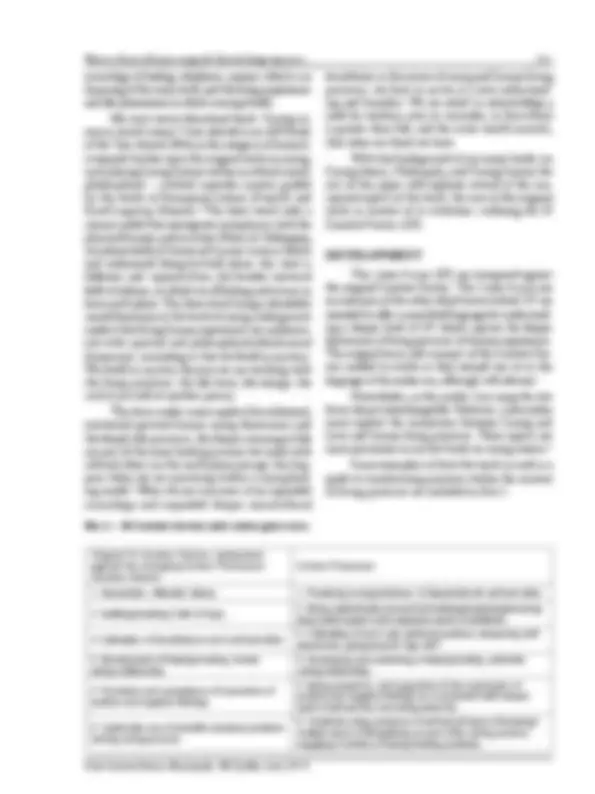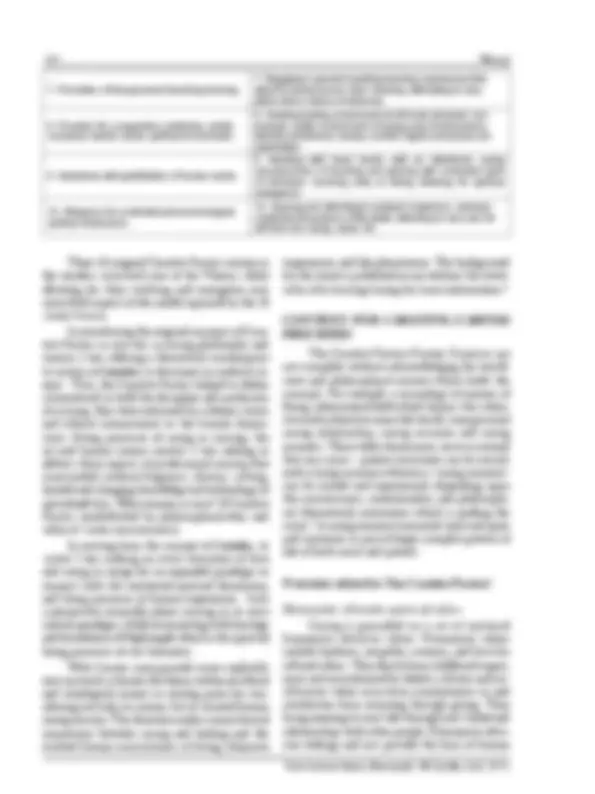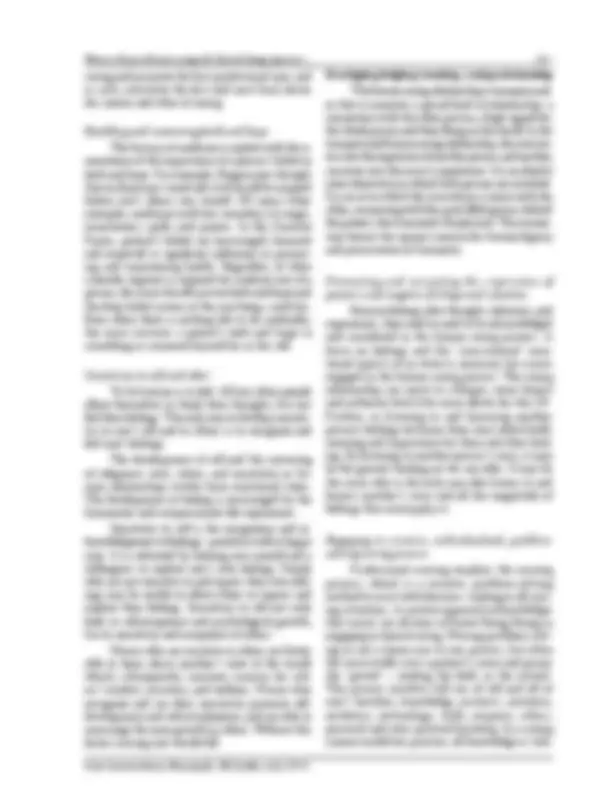





Study with the several resources on Docsity

Earn points by helping other students or get them with a premium plan


Prepare for your exams
Study with the several resources on Docsity

Earn points to download
Earn points by helping other students or get them with a premium plan
Community
Ask the community for help and clear up your study doubts
Discover the best universities in your country according to Docsity users
Free resources
Download our free guides on studying techniques, anxiety management strategies, and thesis advice from Docsity tutors
Jean Watson's Human Caring Theory is a philosophical and ethical framework for nursing practice. the theory's origins, core concepts, and evolution, including the Caritative Factors and Caritas Processes. It emphasizes the importance of subjective living experiences and the role of caring consciousness in nursing.
What you will learn
Typology: Study notes
1 / 7

This page cannot be seen from the preview
Don't miss anything!




A TEORIA DO CUIDADO HUMANO DE WATSON E AS EXPERIÊNCIAS SUBJETIVAS DE VIDA: FATORES CARITATIVOS/ CARITAS PROCESSES COMO UM GUIA DISCIPLINAR PARA A PRÁTICA PROFISSIONAL DE ENFERMAGEM LA TEORÍA DEL CUIDADO HUMANO DE WATSON Y LAS EXPERIENCIAS SUBJETIVAS DE VIDA: FACTORES CARITATIVOS/ CARITAS PROCESSES COMO UNA GUÍA DISCIPLINAR PARA LA PRÁCTICA PROFESIONAL DE ENFERMERÍA
Jean Watson^2
(^1) This manuscript draws upon a previous publication with modifications: Watson J. Carative factors, Caritas processes guide to professional nursing. Danish Clinical Nursing Journal. 2006; 20 (3): 21-7. (^2) PhD, RN, AHN-BC, FAAN. Distinguished Professor of Nursing Murchinson-Scoville Endowed Chair in Caring Science, in the University of Colorado Denver and Health Sciences Center, USA. Web: www.uchsc.edu/nursing/caring
ABSTRACT: This article provides an overview of Watson’s theory of Human Caring, the notion of Caritas and human phenomena. Special emphasis is placed upon the theoretical structure of human caring theory referred to as 10 Carative Factors/ Caritas Processes and subjective living processes and experiences. These core conceptual aspects of the theory and human living processes are grounded within the philosophical and ethical foundation of the body of my caring theory work. Together they serve as a guide for professional practice, as well as a disciplinary blueprint for the Science of Care.
RESUMO: Este artigo fornece uma visão geral da teoria de Cuidado Humano de Watson, a noção de Caritas e o fenômeno humano. Uma ênfase especial é dada sobre os 10 Fatores Caritativos/ Caritas Processes , os processos de viver humano e as experiências subjetivas de vida que fazem parte da estrutura da teoria. Estes aspectos centrais dos conceitos da teoria e processos de viver são desenvolvidos na fundamentação filosófica e ética do corpo da Teoria de Cuidado. Juntos, eles servem como um guia para a prática profissional, bem como, um esquema disciplinar para a Ciência do Cuidado.
RESUMEN: El presente artículo ofrece una visión general sobre la teoría del Cuidado Humano de Watson, la noción de Caritas y el fenómeno humano. En este estudio se da un énfasis especial a los diez factores Caritativos/ Caritas Processes , a los procesos del vivir humano y a las experiencias subjetivas de vida, los cuales forman parte de la estructura de la teoría. Los aspectos centrales de los conceptos de la teoría y los procesos del vivir son desarrollados en el fundamento filosófico y ético del cuerpo de la teoría de Cuidado; todos esos aspectos juntos sirven como una guía para la práctica profesional, así como también un esquema disciplinar para la Ciencia del Cuidado.
KEYWORDS: Teoria de enfermagem. Prática profis- sional. Cuidados de enferma- gem. Enfermagem.
PALAVRAS-CHAVE: Nur- sing theory. Professional practi- ce. Nursing care. Nursing.
PALABRAS CLAVE: Teoria de enfermería. Práctica profe- sional. Atención de enferme- ría. Enfermería.
Watson’s theory of human caring and subjective living experiences...
Endereço: Jean Watson University of Colorado Denver and Health Sciences Center 80262 - Denver, Colorado, USA. Email: Jean.watson@uchsc.edu
Artigo original: Reflexão teórica Recebido em: 15 de agosto de 2006. Aprovação final: 23 de fevereiro de 2007.
The origin of the original theory of human caring was my first book − Nursing: the philosophy and science of caring.^1 This first work was published before there was formal attention to nursing theory as the disciplinary foundation for nursing science, educa- tion, and practice.
The origin of the theory of human caring was first work “emerged from my quest to bring new mean- ing and dignity to the world of nursing and patient care” and to the inner subjective life experiences of self and other.2:49^ It also served to provide an ethical- philosophical foundation for the deeply human dimen- sions of nursing.
The theoretical concepts were derived and emerged from, my personal/professional experiences; they were clinically inducted, empirically grounded and combined with my philosophical, intellectual, and experiential background. Thus, the early work emerged from my own values, beliefs, perceptions and experiences about rhetorical and ineffable questions, e.g. what does it mean to be human? What does it mean to care? What does it mean to heal? What does it mean to develop knowledge and practices about life phenomena and subjective human experiences? What is a living philosophical context for exploring nursing and life meaning in health and illness?
Questions and views of personhood, life, death, change, health, healing, caring, wholeness, pain, suf- fering, and so on, were guiding my quest to identify a framework for nursing as a distinct entity, profession, discipline and science in its own right, separate from, but complementary to medicine. 1 My views were heightened by my commitment to the professional role and mission of nursing; its ethical covenant with soci- ety as sustaining human caring; in honoring the lived experience of self and other; in seeking to preserve humanity, even when threatened; attending to and help- ing to sustain human dignity, unity of oneness of being, to hold the other in their wholeness, even when they could not feel whole themselves. These are all activities which transcend illness, diagnosis, condition, setting, and so on, and are enduring and timeless across time and space and changes in society and science.
Since then, the original work has expanded and evolved through a generation of other theory-based books on caring that followed:
National League for Nursing; 1988. Reprinted/repub- lished, Massachusetts (USA): Jones & Bartlett; 1999.^3
- “Postmodern sursing and seyond”. Edinburgh (Scotland): Churchill-Livingstone. Reprinted/repub- lished, Harcourt-Brace/Elsevier; 1999.^4
Watson J
These 10 original Carative Factors remain as the timeless structural core of the Theory, while allowing for their evolving and emergence into more fluid aspects of the model captured by the 10 Caritas Processes.
In introducing the original concepts of Cara- tive Factors as core for a nursing philosophy and science, I was offering a theoretical counterpoint to notion of Curative so dominant in medical sci- ence. Thus, the Carative Factors helped to define a framework to hold the discipline and profession of nursing; they were informed by a deeper vision and ethical commitment to the human dimen- sions /living processes of caring in nursing; the art and human science context. I was seeking to address those aspects of professional nursing that transcended medical diagnosis, disease, setting, limited and changing knowledge and technology of specialized foci. What remains as core? 10 Carative Factors (embellished by philosophical-ethic and value of Caritas consciousness).
In moving from the concept of Carative , to Caritas I was making an overt evocation of love and caring to merge for an expanded paradigm to connect with the existential-spiritual dimensions and living processes of human experiences. Such a perspective ironically places nursing in its most mature paradigm, while reconnecting with heritage and foundation of Nightingale which is the spiritual living processes of our humanity.
With Caritas incorporated more explicitly into my work, it locates the theory within an ethical and ontological contact as starting point for con- sidering not only its science, but its societal human caring mission. This direction makes a more formal connection between caring and healing and the evolved human consciousness of living subjective
experiences and life phenomena. The background for this work is published on my website. See www. uchsc.edu/nursing/caring for more information.^8
The Carative Factors/Caritas Processes are not complete without acknowledging the world- view and philosophical context which holds the concepts. For example: a cosmology of oneness of Being; phenomenal field which honors the subjec- tive-intersubjective inner life world, transpersonal caring relationship, caring occasion and caring moment. These wider dimensions serve to remind that any nurse – patient encounter can be consid- ered a caring occasion wherein a “caring moment” can be created and experienced, depending upon the consciousness, intentionality, and philosophi- cal (theoretical) orientation which is guiding the nurse.^2 A caring moment transcends time and space and continues as part of larger complex pattern of life of both nurse and patient.
Humanistic: altruistic system of values Caring is grounded on a set of universal humanistic altruistic values. Humanistic values include kindness, empathy, concern, and love for self and others. They derive from childhood experi- ences and are enhanced by beliefs, cultures and art. Altruistic values arise from commitments to and satisfaction from receiving through giving. They bring meaning to one’s life through one’s belief and relationships with other people. Humanistic-altru- istic feelings and acts provide the basis of human
Watson J
caring and promote the best professional care, and as such, constitute the first and most basic factor for science and ethic of caring.
Enabling and sustaining faith and hope
The history of medicine is replete with docu- mentation of the importance of a person’s belief in faith and hope. For example, Hippocrates thought that an ill person’s mind and soul should be inspired before one’s illness was treated. IN many other examples, medicine itself was secondary to magic, incantations, spells, and prayers. In this Carative Factor, patient’s beliefs are encouraged, honored and respected as significant influences in promot- ing and maintaining health. Regardless of what scientific regimen is required for medical care of a person, the nurse should nurture faith and hope and the deep belief system of the one-being- cared for. Even when there is nothing left to do medically, the nurse nurtures a patient’s faith and hope in something or someone beyond his or her self.
Sensitivity to self and other
To be human is to feel. All too often people allow themselves to think their thoughts, but not feel their feelings. The only way to develop sensitiv- ity to one’s self and to others is to recognize and feel one’s feelings.
The development of self and the nurturing of judgment, taste, values, and sensitivity in hu- man relationships evolve from emotional states. The development of feeling is encouraged by the humanities and compassionate life experiences.
Sensitivity to self is the recognition and ac- knowledgement of feelings – painful as well as happy ones. It is cultivated by looking into oneself and a willingness to explore one’s own feelings. People who are not sensitive to and repress their own feel- ings may be unable to allow others to express and explore their feelings. Sensitivity to self not only leads to self-acceptance and psychological growth, but to sensitivity and acceptance of others.
Nurses who are sensitive to others are better able to learn about another’s view of the world which, subsequently, increases concern for oth- ers’ comfort, recovery, and wellness. Nurses who recognize and use their sensitivity promote self- development and self-actualization, and are able to encourage the same growth in others. Without this factor nursing care would fall.
Developing helping: trusting, caring relationship The human caring relationship is transpersonal. in that it connotes a special kind of relationship: a connection with the other person, a high regard for the whole person and their Being-in-the-world. In the transpersonal human caring relationship, the nurse en- ters into the experience of another person, and another can enter into the nurse’s experiences. It is an ideal of intersubjectivity in which both persons are involved. It is an art in which the nurse forms a union with the other, connecting with the spirit-filled person, behind the patient, that transcends the physical. This connec- tion honors the upmost concern for human dignity and preservation of humanity.
Promoting and accepting the expression of positive and negative feelings and emotions Because feelings after thoughts, behavior, and experiences, they need to need to be acknowledged and considered in the human caring process. A focus on feelings and the “non-rational” emo- tional aspects of an event is necessary for nurses engaged in the human caring process. The caring relationship can move to a deeper, more honest and authentic level if he nurse allows for this CF. Further, in listening to and honoring another person’s feelings we honor their story which holds meaning and importance for them and their heal- ing. By listening to another person’s story, it may be the greatest healing act we can offer. It may be the nurse who is the only one who listens to and honors another’s story and all the magnitude of feelings that accompany it.
Engaging in creative, individualized, problem- solving caring process Professional nursing employs the nursing process, which is a creative, problem-solving method to assist with decision –making in all nurs- ing situations. A creative approach acknowledges that nurses use all ways of know/being/doing in engaging in clinical caring. Nursing problems solv- ing in not a linear one to one process, but often the nurse walks into a patient’s room and grasps the “gestalt’ – reading the field, in the instant. This process involves full use of self and all of one’s faculties, knowledge, instincts, intuition, aesthetics, technology, skills, empirics, ethics, personal and even spiritual knowing. In a caring science model for practice, all knowledge is valu-
Watson’s theory of human caring and subjective living experiences...
metaphysical aspects of human experiences and phenomena which do not conform to conventional views of science and rational thinking. Nevertheless these unknowns are real to those affected. This CF allows for spiritual filled meanings and unknowns to emerge open to infinite possibilities for miracles. This CF honors spirit- filled meanings, cultural be- liefs, myths, and metaphors and inner subjective life world of nurse and patients and families, allowing cures and miraculous cures and healings.
Finally this framework for Caring Science and practices proposes that nursing, individually and collectively, contributes to the preservation of humanity and seeks to sustain caring in instances where it is threatened. The Carative Factors/ Caritas Processes serve as structure and order for a theoretical − philosophical foundation for the discipline and profession of nursing. The moral ideals and caring factors and processes proposed foster the evolution and deepening of humankind and serve to sustain humanity.
1 Watson J. Nursing: the philosophy and science of caring. Boston (USA): Little Brown; 1979. Boulder (Colorado/USA): Colorado Associated University Press; reprinted 1985. 2 Watson J, The theory of human caring: retrospective and prospective. Nursing Science Quarterly. 1997 Mar; 10 (1): 49-52. 3 Watson J. Nursing human science and human care: a theory of nursing. Connecticut (USA): Appleton- Century Crofts; 1985. New York (USA): National League for Nursing; reprinted 1988. Massachusetts (USA): Jones and Bartlett; reprinted 1999. 4 Watson J. Postmodern nursing and beyond. Edinburgh (Scotland):Churchill-Livingstone.NewYork(NY/USA): Harcourt-Brace/Elsevier; reprinted 1999. 5 Watson J. Caring science as sacred science. Philadelphia (USA): FA Davis; 2005. 6 Levinas E. Totality & infinity. Pittsburgh (PA): Duquesne University; 1969. 7 Logstrup K. The ethical demand. Notre Dame (Indiana/ USA): University of Notre Dame; 1997. 8 Watson J. Theory of human caring [acesso em 2006 Nov 11].Disponívelem:http://www.uchsc.edu/nursing/caring 9 Quinn J. Holding sacred space: the nurse as healing environment.HolisticNursingPractice1992Apr;6(4):26-35.
Watson’s theory of human caring and subjective living experiences...